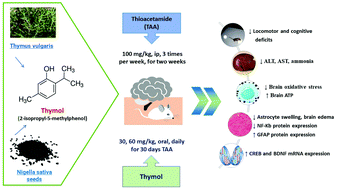In the present study, we aimed to delineate the neuroprotective potential of thymol (THY) against neurotoxicity and cognitive deterioration induced by thioacetamide (TAA) in an experimental model of hepatic encephalopathy (HE). Rats received TAA (100 mg kg−1, intraperitoneally injected, three times per week) for two weeks. THY (30 and 60 mg kg−1), and Vit E (100 mg k−1) were administered daily by oral gavage for 30 days after HE induction. Supplementation with THY significantly improved liver function, reduced serum ammonia level, and ameliorated the locomotor and cognitive deficits. THY effectively modulated the alteration in oxidative stress markers, neurotransmitters, and brain ATP content. Histopathology of liver and brain tissues showed that THY had ameliorated TAA-induced damage, astrocyte swelling and brain edema. Furthermore, THY downregulated NF-kB and upregulated GFAP protein expression. In addition, THY significantly promoted CREB and BDNF expression at both mRNA and protein levels, together with enhancing brain cAMP level. In conclusion, THY exerted hepato- and neuroprotective effects against HE by mitigating hepatotoxicity, hyperammonemia and brain ATP depletion via its antioxidant, anti-inflammatory effects in addition to activation of the CREB/BDNF signaling pathway.

